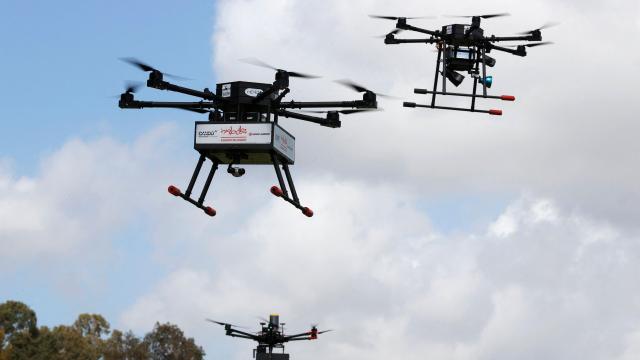Coming to a city near you: the low-frequency buzz of a robot flying over your head. Yes, a bevy of companies appear poised to realise their long-held dream of filling America’s cityscapes with the sight of product-clutching drone armadas.
On Saturday, the Wall Street Journal reported that some of the world’s biggest firms had begun to quietly roll out commercial drone delivery services in communities across the country. The participants include Amazon, Walmart, and Google’s parent company Alphabet, among others. Many of these companies have already been conducting tests for drone deliveries for quite some time — but this year many of them are officially scaling up and rolling out commercial operations. The Journal’s reporting that the locations that have been selected for business, commercial delivery operations will apparently involve “dozens” or even “hundreds” of deliveries per day.
On Saturday, the Wall Street Journal reported that several big companies had begun to quietly roll out commercial drone delivery services in cities across the country. This list allegedly includes Amazon, Walmart, and Google’s parent company Alphabet, among others. Many of these companies have already been conducting tests for drone deliveries for quite some time but, this year, many of them are said to be scaling up and rolling out commercial operations. The Journal reports that, in the locations that have been selected for business, commercial delivery operations will apparently involve “dozens” or even as many as “hundreds” of deliveries per day.
As example, the Alphabet-owned Wing drone company announced Monday that it is officially launching its first commercial delivery service in the U.S. this week in Texas. The deliveries will be targeted at multiple neighbourhoods throughout the Dallas area, where Wing has been testing deliveries since last year. Deliveries start on Thursday, April 7.
“We’re going to be starting small in the Dallas-Fort Worth Metroplex, with service to tens of thousands of suburban homes in the City of Frisco and Town of Little Elm,” said Adam Woodworth, chief technology officer at Wing, in a blog post published Monday. “In addition to Walgreens, we’ll be delivering items with three new partners in Frisco and Little Elm. We’re going to be delivering ice cream from Blue Bell Creameries (yes – it will stay frozen on those hot Texas summer days!), prescription pet medications from easyvet, and first aid kits from Texas Health.”
Woodworth also called the launch the “first ever commercial drone delivery service in a major U.S. metropolitan area.”
Since its inception several years ago, the commercial drone delivery industry has weathered a number of challenges, not least of which is the complicated regulatory details that need to be ironed out before a broader deployment of flying delivery workers is realised. The Journal notes that lawmakers have worried about “the things that could go wrong if the skies above America were darkened with swarms of delivery drones — such as drones crash-landing or, worse, colliding with passenger aircraft,” which all seems pretty reasonable.
All of that aside though, I’ll be honest: If winged deliveries are the way of the future, I sorta don’t love it. I don’t love it for a number of reasons but chief among them is the fact that, which few exceptions, drone delivery in urban and metropolitan areas seems almost entirely unnecessary. I could see how automated deliveries might be helpful in a war zone, where medical supplies and food need to be trafficked into a region without risking the lives of service members. They might even be useful in America’s rural environs — where the nearest pharmacy is potentially dozens of miles away and a trip to pick up medicine is an actual chore. But in a metropolitan area like Dallas, where the biggest inconvenience of a pharmacy visit is that a person might be forced to actually exert themselves by getting off the couch, what is the actual point?
Proponents of drone deliveries have claimed they will have a positive environmental impact, though the science is largely still out on that claim. You could also see why this service would be helpful for homebound seniors but, then again, we already have human service delivery for that. More to the point: I don’t really want to have to duck flying robots while I’m out for a stroll, all so that some guy down the street can get a box of Mucinex delivered to his house.
